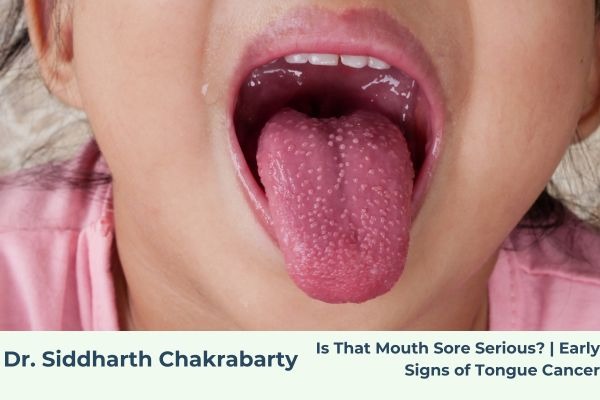Is That Mouth Sore Serious? | Early Signs of Tongue Cancer
Learn how to spot the early signs of tongue cancer. Discover when a mouth sore might be more than just irritation and why early diagnosis is key.
4/8/20252 min read


Is That Mouth Sore Serious? | Early Signs of Tongue Cancer with Dr. Siddharth Chakrabarty
We all experience occasional mouth sores — from hot food, accidental bites, or stress. But what if that sore doesn’t go away? According to Dr. Siddharth Chakrabarty, a trusted cancer specialist, a persistent sore might be an early sign of tongue cancer, a condition that’s more treatable when detected early.
🔍 What Is Tongue Cancer?
Tongue cancer is a type of oral cancer that forms in the squamous cells lining the tongue. It can develop in two main areas:
The oral tongue – the front two-thirds, visible in your mouth
The base of the tongue – part of the throat, harder to detect
Early detection and timely treatment are crucial to prevent the cancer from spreading.
⚠️ Early Signs You Shouldn’t Ignore
Dr. Chakrabarty advises looking out for symptoms that persist beyond two weeks. Common warning signs include:
A sore or ulcer on the tongue that doesn’t heal
A red, white, or mixed-color patch on the tongue
A lump or thickened area on the tongue
Pain or burning while eating or drinking
Unexplained bleeding from the tongue
Numbness or tingling in the tongue or mouth
Difficulty moving the tongue or speaking clearly
💡 Note: Smokers, tobacco chewers, and heavy drinkers are at higher risk and should be extra cautious.
🚬 What Causes Tongue Cancer?
Several risk factors can increase your chances of developing tongue cancer:
Tobacco use (smoking or chewing)
Excessive alcohol consumption
HPV (Human Papillomavirus) infection
Poor oral hygiene
Family history of oral cancers
🧪 Diagnosis & Tests
If tongue cancer is suspected, Dr. Chakrabarty typically recommends:
A thorough oral examination
A biopsy of any suspicious lesion
Imaging tests like CT, MRI, or PET scan to check the extent of spread
🩺 Treatment Options
Treatment depends on the stage and location of the tumor. Common treatments include:
Surgical removal of the tumor
Radiation therapy, often used post-surgery
Chemotherapy for advanced cases
Targeted therapy or immunotherapy in selected cases
With early diagnosis, many patients recover fully and return to their normal lives.
💬 When to See a Specialist
If you have a sore, lump, or patch on your tongue that doesn’t improve within two weeks, it’s time to see a specialist. Early evaluation can prevent complications and lead to better outcomes.
Dr. Siddharth Chakrabarty encourages everyone to take persistent oral symptoms seriously and not wait for them to worsen.
✅ Final Thoughts
That lingering mouth sore might be more than just an irritation. With rising oral cancer rates, especially linked to lifestyle habits, being proactive about your health is essential.
👉 Don’t ignore the signs. If something feels off, consult a specialist like Dr. Siddharth Chakrabarty. Early detection could save your life.